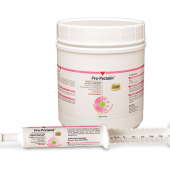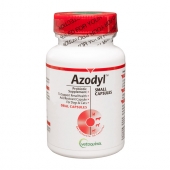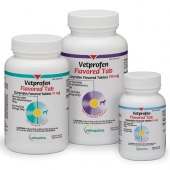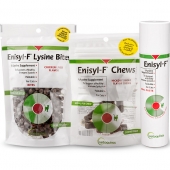Was your new kitten diagnosed with Feline Herpes Virus (FHV-1)? It’s not uncommon, in fact almost all cats are exposed to FHV-1 as kittens, either by their mother or by another cat. Up to 80% of cats develop a hidden (referred to as dormant or latent) infection and become carries of FHV-1 for life. Symptoms, also referred to as flare ups, may occur during times of stress or other illness.
It can be scary and intimidating when your cat isn’t feeling well. Here’s a quick guide including some terms you may have heard from your veterinarian when discussing FHV-1.
What is Feline Herpes Virus (FHV-1):
Feline herpes virus is a common viral infection that can affect cats of all ages and breeds worldwide. FHV-1 is an upper respiratory infection of the nose and throat in cats with no cure. Typically, upper respiratory infections last between 7-21 days. If you do not see improvement in your cat, or suspect they are suffering from an upper respiratory infection, make an appointment with your veterinarian. FHV-1 cannot be passed from your cat to you – it’s not transferrable to humans.
Symptoms (Flare-ups) of FHV-1:
- Red eyes
- Squinting
- Eye discharge
- Sudden, repetitive acts of sneezing
- Runny nose
- Loss of sense of smell, leading to a lack of interest in food
- Swelling and redness of eyelids
- Fever
- Lethargy
Treatment Options for FHV-1:
- Lysine Supplementation: Lysine has been used to help support immune function in cats for over a decade. Lysine (more specifically, L-Lysine) is an essential amino acid which can slow viral replication. Lysine allows the cat’s immune system to respond more effectively and may slow the progression, severity and flare-up frequency of FHV-1 infections. Twice daily administration of lysine can provide this immune support. For best results, Veterinarians suggest administering 500 mg of lysine twice daily (250 mg twice daily for kittens under 6 months old).
- Stress Management: Long term or short term stressors may cause a FHV-1 flare up to last longer. To alleviate stress at home, set up a place in your house where you cat can rest comfortably and quietly. Typically these restful places are away from other pets, children and loud sounds. There are behavior supplements available to help your cat better cope with the stress of an FHV-1 flare up. Stress management should be addressed as part of your treatment plan.
- Antibiotics: FHV-1 is a virus and will not respond to antibiotics (antibiotics will not treat or eradicate FHV-1). Veterinarians may prescribe antibiotics to treat secondary bacterial infections that can arise due to a weakened immune system caused by an FHV-1 flare up.
If your cat is showing signs of feline herpes virus infection, please make an appointment with your veterinarian for an examination.






